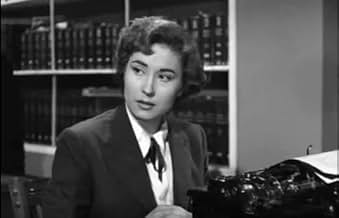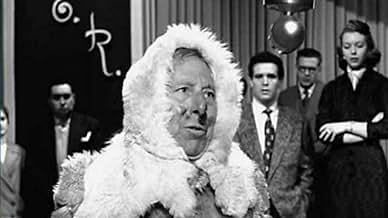Tres pequeñas historias basadas en concursos radiofónicos, todas ellas enlazadas a través del locutor Gabriel y su prometida.Tres pequeñas historias basadas en concursos radiofónicos, todas ellas enlazadas a través del locutor Gabriel y su prometida.Tres pequeñas historias basadas en concursos radiofónicos, todas ellas enlazadas a través del locutor Gabriel y su prometida.
- Premios
- 2 premios en total
Imágenes
Juanjo Menéndez
- Alfredo
- (as Juan José Menéndez)
Teresa del Río
- Empleada
- (as María Teresa del Río)
Nicolás D. Perchicot
- El médico
- (as Nicolás Perchicot)
Argumento
¿Sabías que...?
- ConexionesReferenced in Días de radio (1987)
- Banda sonoraLa Romera
Written by José Antonio Ochaíta (as Ochaíta), Xandro Valerio (as Valerio), and Juan Solano (as Solano)
Performed by Gracia Montes
Reseña destacada
By the time he made this, Sáenz de Heredia (who also filmed the Generalísimo's pungent attempt at a movie script, "Raza") was as efficient a facilitator of respectable, high-gloss, low-calorie regime-friendly entertainments as they come. Where this one deserves most credit is in the storyline, which contrives to hang several short tales onto a single narrative thread. The device works, and this in combination with a suavely persuasive offscreen narrator gives a sense that "the radio" is not merely a plotting pretext, but the object of a genuinely felt tribute. Of course we're talking not about the radio as instrument of government propaganda, nor as purveyor of mindless muzak, but as something that gets fat middle-aged men out of bed in the morning (to do slimming exercises), gives humble inventors the chance to win money for their prototypes (by dressing up as eskimos), persuades thieves to reach agreement with their intended victims in donating money to the Church, and allows old schoolmasters to win money in a quiz game called "Double or Nothing", in order (natch) to send a sick child to Stockholm for treatment.
When Heredia tries his hand at straightforward slapstick, as with the José Isbert number of the eskimo-inventor with the dangerous dog early in the film, it's quite nicely done, and the laughs come easily. When he laces the comedy with sentimentality, and deliberately racks up the sentiment in a steady crescendo throughout, it would take a very undemanding (or old-fashioned) audience nowadays not to get restless. That a dispute (for example) between would-be burglar and intended victim is resolved by a Parish priest is perhaps sociologically admissible; that this priest should be portrayed as a paragon of wisdom and Christian virtues is perhaps understandable given ths strictures of censorship and so on; but the sentimental excesses of this movie go well beyond that, and include a penitent bread-thief in a church, a dying boy whose every other script sentence contains a Noble Gesture; and a schoolmaster who is so well aided by the praying boy and the intercession of Saints, that he develops a previously unsuspected footballing career. If this kind of thing doesn't stand up so well nowadays (not to mention statues of saints that come alive) it's perhaps just a question of fashion. All the same, you end up thanking your nearest St Antony for the genius of a Berlanga, who could make a film funny without playing any of the cheap sentiment cards that this movie has recourse to. Watchable but terminally dated.
When Heredia tries his hand at straightforward slapstick, as with the José Isbert number of the eskimo-inventor with the dangerous dog early in the film, it's quite nicely done, and the laughs come easily. When he laces the comedy with sentimentality, and deliberately racks up the sentiment in a steady crescendo throughout, it would take a very undemanding (or old-fashioned) audience nowadays not to get restless. That a dispute (for example) between would-be burglar and intended victim is resolved by a Parish priest is perhaps sociologically admissible; that this priest should be portrayed as a paragon of wisdom and Christian virtues is perhaps understandable given ths strictures of censorship and so on; but the sentimental excesses of this movie go well beyond that, and include a penitent bread-thief in a church, a dying boy whose every other script sentence contains a Noble Gesture; and a schoolmaster who is so well aided by the praying boy and the intercession of Saints, that he develops a previously unsuspected footballing career. If this kind of thing doesn't stand up so well nowadays (not to mention statues of saints that come alive) it's perhaps just a question of fashion. All the same, you end up thanking your nearest St Antony for the genius of a Berlanga, who could make a film funny without playing any of the cheap sentiment cards that this movie has recourse to. Watchable but terminally dated.
- Hedgehog_Carnival
- 8 may 2004
- Enlace permanente
Selecciones populares
Inicia sesión para calificar y añadir a tu lista para recibir recomendaciones personalizadas
Detalles
- Duración1 hora 35 minutos
- Color
- Mezcla de sonido
- Relación de aspecto
- 1.37 : 1
Contribuir a esta página
Sugerir un cambio o añadir el contenido que falta

Principal laguna de datos
What is the English language plot outline for Historias de la radio (1955)?
Responde





























